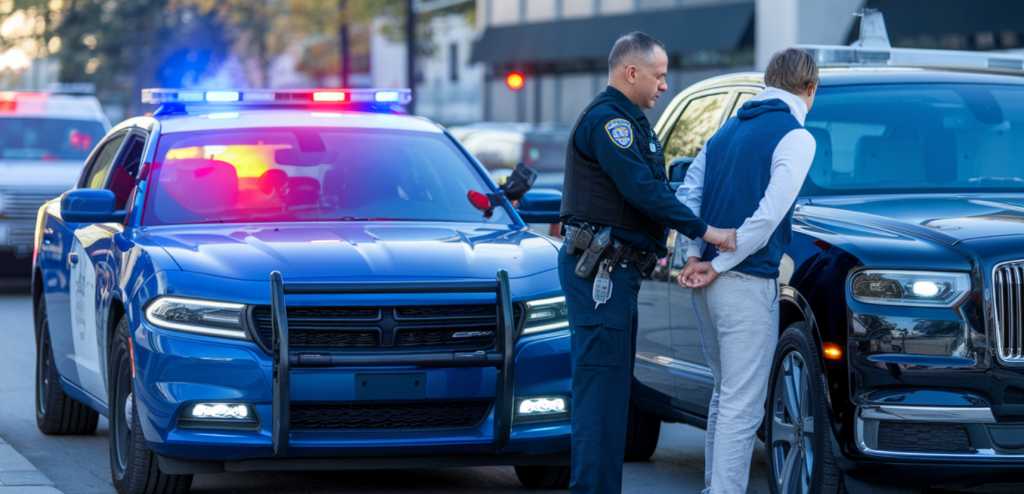What should I do about a traffic warrant?
You do not need to risk arrest and jail time. If you have a warrant for a traffic offense, we can help you set it aside and resolve your case.

Don’t wait to be arrested. There is no need for you to go to jail.
Many wonder if a court can issue a warrant for a traffic offense, civil infraction, or traffic misdemeanor. The answer is a bit complicated. If a traffic warrant is issued, does that mean there is a misdemeanor? If there is a warrant, what should I do to get rid of it?
A warrant is a court order requiring a person’s arrest and commanding their appearance before the judge. A judge can issue a warrant for many traffic offenses. There are two types of traffic cases: civil infractions and traffic crimes, such as felonies, misdemeanors, and ordinance violations. Traffic crimes can be felonies; however, they are most commonly misdemeanors.
Warrant for a Civil Infraction
A judge can issue a bench warrant for a traffic ticket if someone fails to deal with a civil infraction ticket or fails to appear in court for a hearing. Most courts do not issue arrest warrants for speeding tickets, failure to stop for a red light or stop sign, improper lane usage, or other similar civil infractions. In most cases where a driver fails to appear in court or pay the fine for a civil infraction, the court will suspend the person’s driver’s license and only set aside the suspension when the person comes before the court resolves the traffic ticket. On the other hand, some judges will not hesitate to issue a warrant, resulting in a serious problem.
Police officers can arrest someone with a warrant anytime, anywhere. A person arrested on a warrant might be required to remain in jail until their case concludes. It is better to deal with a traffic citation without delay. Resolving a case without delay does not mean that you should pay for the ticket. It is almost always in a driver’s best interest to demand a hearing and “fight a ticket.” Prosecutors routinely give defendants deals if they voluntarily appear in court for a hearing on a traffic ticket. In many cases, the prosecutor may be willing to waive the points or dismiss a ticket upon payment of a fine. The best chance of getting the points eliminated and keeping a ticket off a driver’s record is with an experienced traffic ticket defense attorney.

Warrant for a Traffic Misdemeanor
Warrants are common in misdemeanor cases. Many misdemeanors start with the issuance of a warrant. In other cases, a defendant who fails to appear for a court hearing or abide by a court order risks an arrest warrant. In many traffic misdemeanor cases, police tell the person that the court will contact them when a warrant is issued. Unfortunately, courts and police departments routinely fail to send a notification when a warrant is issued. This failure to send notice results in the arrest of unsuspecting people who then are stuck in jail when they didn’t even know they had pending traffic charges.
Common traffic misdemeanors include:
- Driving with License Suspended/Revoked
- Reckless Driving
- Leaving the Scene of a Property Damage Accident (Hit and Run)
- Failure to Stop or Identify After a Personal Injury Accident
- Operating While Intoxicated (OWI, DUI, OWPD, OWVI, etc.)
- Open Intoxicant in Vehicle
- Drag Racing
- Drove on a Sidewalk
- Failed to Display License / No Operator’s License on Person
- Failed to Obtain Michigan Plates
- Improper Plate / Registration
If a court issues a warrant on a new traffic misdemeanor, the judge might require the defendant to appear in court personally. The judge may or may not set a bond that requires a cash deposit. A cash bond requires the defendant to post money with the court to avoid serving time in jail while the misdemeanor case works its way through the court.
A “bench warrant” is issued when a defendant fails to appear for a scheduled court hearing. If a “bench warrant for a traffic ticket” is issued, the defendant must appear before the judge and explain why they failed to appear in court. A judge may decide to forgive the failure to appear. If this happens, the judge will set aside the warrant, reinstate the bond, and set a new hearing date. On the other hand, an unforgiving judge may forfeit any bond previously paid to the court and then require additional money before the defendant can leave the court or jail.
It is always best to hire an experienced, reputable attorney to protect and defend you when appearing in court. A traffic warrant lawyer can not only help convince a judge to set a low or personal (no money) bond; they will likely be able to negotiate with the prosecutor to have the charge dismissed or reduced. If the government and the defendant cannot resolve a misdemeanor amicably, the defendant has the right to a trial.

Can I pay a fine to get rid of a misdemeanor traffic warrant?
No. You can pay a fine to resolve a civil infraction ticket, like speeding or a seatbelt violation; however, you cannot resolve a misdemeanor without a court appearance. In some cases, an experienced lawyer may be able to appear on your behalf or negotiate an appearance by mail, phone, or video. Many unsuspecting drivers pay the cost of a misdemeanor traffic violation, mistakenly thinking that the payment will resolve the case. These individuals inevitably end up getting arrested on a misdemeanor traffic warrant. Because a misdemeanor is punishable by the possibility of jail (in some cases, up to one year) and up to two years of probation, simply paying a fine will not be sufficient to resolve or close a case.
How can a lawyer help with a traffic misdemeanor, and why is it worth hiring an attorney?
There are various reasons why a person accused of a traffic crime should retain the best lawyer they can get to defend and protect them. A surprising number of judges impose jail time for traffic misdemeanors, especially in Oakland, Wayne, and Macomb Counties. Judges impose up to 2 years of probation in Michigan. Probation can be costly, and judges can prohibit you from consuming alcohol, driving, using medical marijuana, and much more. A traffic misdemeanor conviction can also result in the suspension or revocation of your driver’s license. Many people do not realize that some misdemeanor traffic convictions remain on your record forever. Michigan’s expungement law expressly excludes many misdemeanor convictions under the Motor Vehicle Code. Do not go to court without a lawyer because you will not get a second bite at the apple if things go wrong. The stakes are surprisingly high, the rules are complex, and there is no room for error or lack of preparation.

Traffic Warrant Attorney in Michigan
If you are charged or accused of a traffic offense, especially a misdemeanor or felony, it is critical that you retain a lawyer to protect you. A seasoned and skilled defense lawyer gives you the best hope of avoiding jail and preventing a criminal conviction. The lawyers with LEWIS & DICKSTEIN, P.L.L.C. have decades of experience and an unparalleled track record of successfully defending clients with traffic warrants and other traffic misdemeanors and felony charges.
Call us today at (248) 263-6800 for a free consultation or complete an online Request for Assistance Form. We will contact you promptly and find a way to help you.








